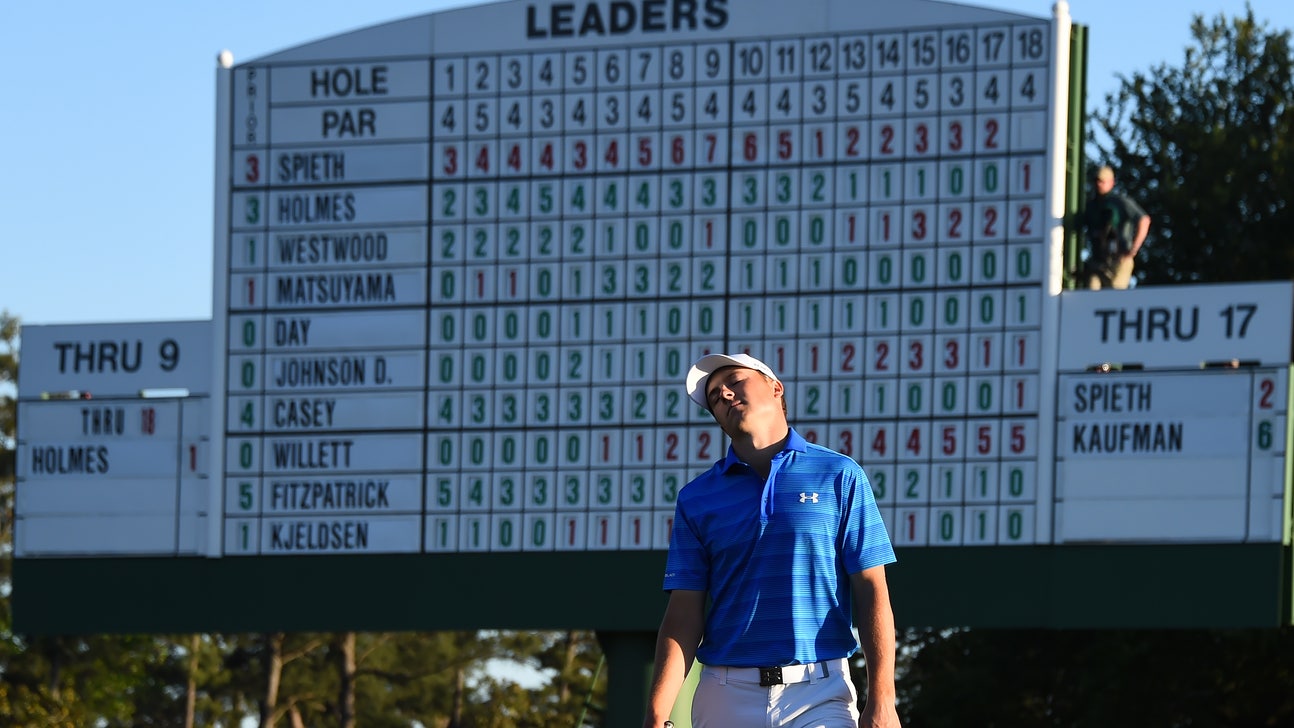
How Jordan Spieth collapsed and had the worst hole in Masters history

At around 5 p.m. ET on Sunday, reigning Masters champion Jordan Spieth had a five-shot lead at Augusta and was simply a few holes from making all sorts of history with a third major victory and second Masters title at 22, not to mention being the only man to go wire-to-wire in back-to-back years at the tournament. Then, in a grand total of 50 minutes, after Spieth's epic, out-of-nowhere meltdown on a 12th hole that will forever live in Masters infamy, the reigning champion was four shots back, a nine-hole swing in the time it took you to eat dinner. It was so stunning it's still hard to wrap your head around. No contender quadruple-bogeys a hole on the back-nine of a major, let alone the greatest young golfer in the world who was cruising to victory like he had the top down in a convertible.
Look at it this way: Jean Van De Velde, who until 6 p.m. ET had the most famous one-hole blow-up in a Slam, still managed to triple-bogey No. 18 in his disaster at Carnoustie.
Though the names of Greg Norman (who blew a huge Masters lead to lose the tournament to an Englishman) and Van De Velde (whose one-hole blowup lost him a surefire major title) will be brought up in every Spieth story, piece or segment over the next few months, theirs were nothing like Spieth's.

(Photo by Harry How/Getty Images)
The Norman collapse at the 1996 Masters was a four-hour descent into sporting hell, not the out-of-nowhere choke we saw Sunday. Yes, both he and Spieth were up five to start the day, but that was about the only similarity. Norman's was a gradual collapse, like the sinking of a ship. The Aussie made the turn with a two-shot lead on Nick Faldo, not because of any blowups, but with the occasional bogey combined with some birdies from the current CBS analyst. After starting the back-nine bogey-bogey, the tournament was tied. By 13, Norman was down two and wouldn't get any closer.
Van De Velde was a victim of his own hubris, something he'll proudly admit today. Needing only a double-bogey to win the 1999 British Open, the Frenchman hit driver off the tee for reasons only known to him and the gods of golfing. Somehow, the ball stayed dry and Van De Velde, given a reprieve, clearly would lay up and have to hole out the final 100 yards in four strokes. He didn't, choosing to hit the ball through rough only to see it land on rocks in the water. The picture of him taking off his shoes as he decided whether to hit the ball out of the burn is one of the most famous in the sport's history. Van De Velde eventually did get down in seven after holing a nice putt and made a playoff, but lost there.
Then there's Spieth. His wasn't the slow burn like Norman, nor was it complete implosion of Van De Velde (if you didn't see that one, imagine one of those domed stadiums coming down with explosives). This was something different altogether.

(Photo by Andrew Redington/Getty Images)
His bogeys on Nos. 10 and 11 were bad, as was hitting it in the water on the par-3 No. 12. But everybody hits bad shots. Those weren't the chokes. They were tough holes and a bad shot, but barely. If the tee shot on No. 12, for instance, had flown a few feet more Spieth would have had an easy two-putt for a par and an eventual win. No, it was those next two penalty shots - the inexplicable chunk (which Spieth inexplicably didn't take from the drop area) that also found the water, then the overcompensating blading he had on shot No. 5 that flew the green and forced him to complete a solid up-and-down to "save" quad-bogey. The first penalty shot was so bad it almost didn't get to the water, if you can believe that.
That Spieth managed to come back with a birdie on the next hole and had a chance to pull a Jack Nicklaus, on the 30th anniversary of his famous comeback win in 1986, by draining a birdie on No. 16 that would have put him within one shot of the lead, is a testament to his fortitude and greatness. But he sped it by hole, taking out all the break and missing left.
It essentially clinched the victory for Danny Willettt, a lightly regarded Englishman who clearly benefitted from Spieth's choke job, but certainly didn't back his way into a win. He hit four-straight birdies from No. 13 to No. 16 and his -5 total still would have put pressure on Spieth even if he'd parred No. 12. Willett thus becomes one of the most tragic kind of major winners: A footnote to the meltdown that helped fit him into a green jacket.

(JIM WATSON/AFP/Getty Images)
How will Spieth bounce back? The best comparison to make is to Rory McIlroy, who collapsed on No. 10 at the 2011 Masters then came back and won the very next major, crushing U.S. Open records at Congressional just two months later. (Norman was 41 at the '96 Masters and Van De Velde was a journeyman before or after. They can't be compared.)
But there's still reason for concern. Over the past year, the names Jack and Tiger have been brought up anytime people discussed Spieth's future. Neither of them ever played such an important hole so horribly even in their worst nightmares.
That's where No. 12 will reside firmly in Jordan Spieth's subconscious for the rest of his career. It doesn't mean he won't win a handful of majors or challenge Tiger or maybe one day make a run at Jack. It just means that anytime he stands over a shot with a lead, that memory of a historically horrible, Masters-choking hole, will always be somewhere, threatening to bubble to the surface at any time.

(Photo by Kevin C. Cox/Getty Images)
